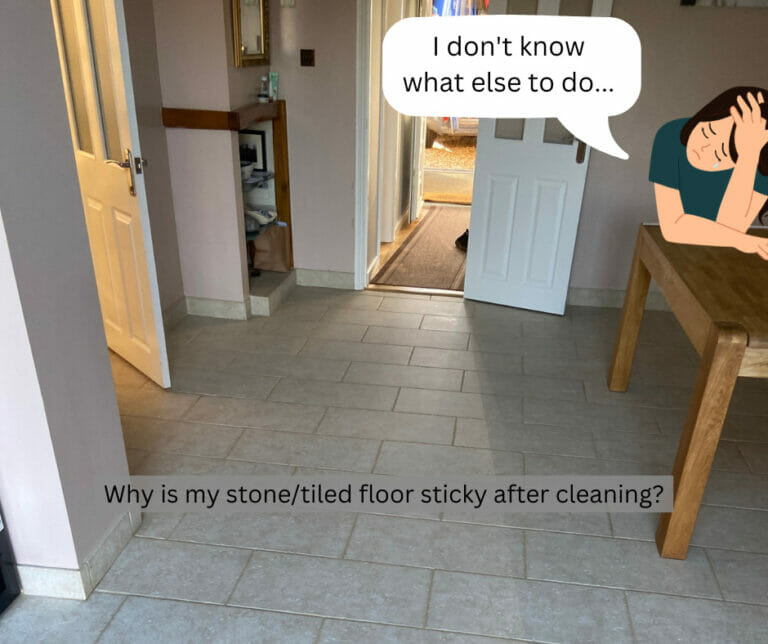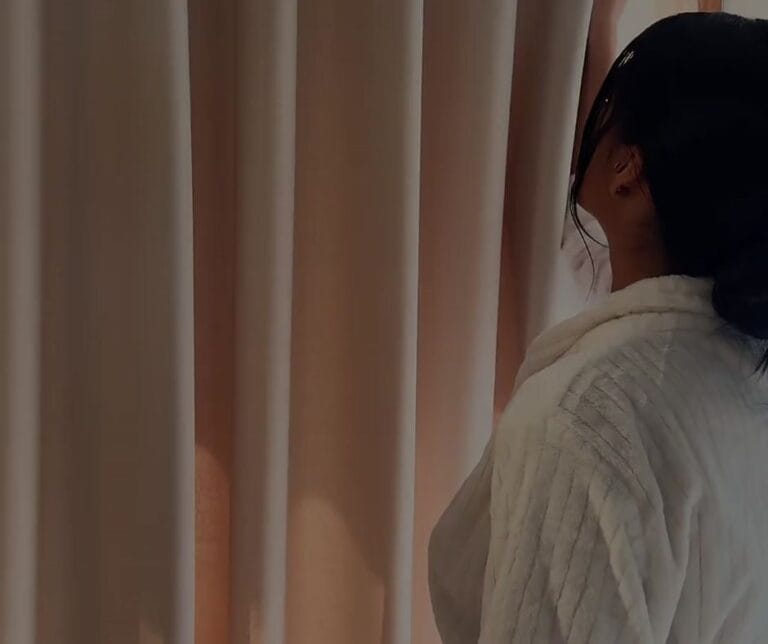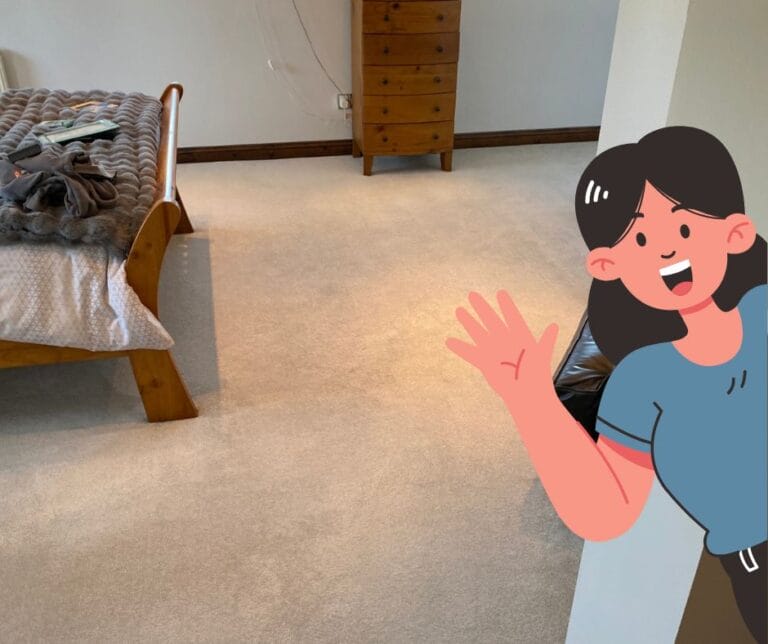The most annoying thing that could happen after cleaning your stone/tiled floor is it immediately becomes sticky and dirty.
If you have had this happen and want to know how to stop it from happening again, you have come to the right place! I will cover… the different types of stone/tiled floors, what cleaning solutions we recommend, and why your stone floor will become sticky quicker.
The different types of stone/tiled floors:
Many different types of stone and tiled floors are commonly used in the UK, each with unique characteristics and aesthetic appeal. These are some of the most popular types of tiles seen in the UK:
-
Ceramic tiles:
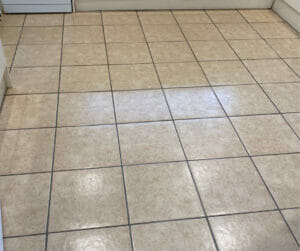
They make these from clay that has been fired at high temperatures and come in a vast variety of colours, sizes, and patterns. These tiles are easy to clean and highly durable, making them a common choice for kitchens, bathrooms, and high-traffic areas.
-
Porcelain tiles:
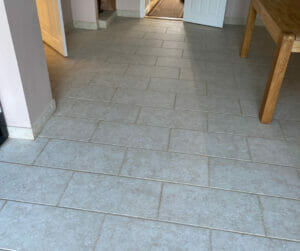
Like ceramic tiles but denser and less porous, porcelain tiles are extremely strong and resistant to wear and tear. They use these often in outdoor spaces and commercial buildings.
-
Natural stone:
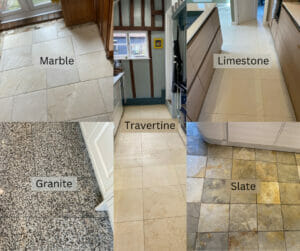
This includes limestone, marble, granite, travertine, and slate, all offering a unique and natural appearance. These stone floors are highly durable but require more maintenance than ceramic or porcelain tiles due to their porous nature.
-
Terracotta:
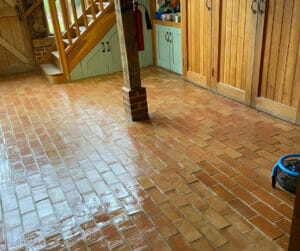
Made from baked clay, terracotta tiles offer a warm and rustic feel. They are porous and require regular sealing to prevent staining.
-
Quarry tiles:
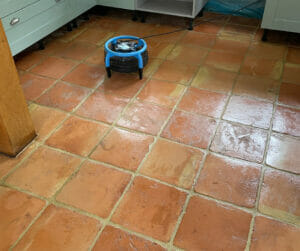
They fire these at a lower temperature than ceramic tiles and make them from clay. Quarry tiles are highly durable and have a natural, earthy appearance. They often use them in outdoor spaces and commercial buildings.
-
Vinyl tiles:
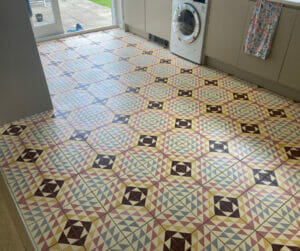
These synthetic tiles offer a wide range of designs and colours, highly durable and low maintenance. They often use these in commercial buildings. However, they can also be a cost-effective option for homes.
-
Engineered stone:
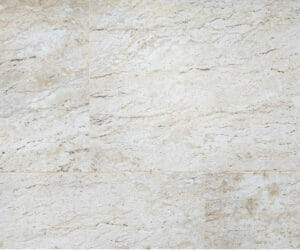
Composite materials made from stone chips, resins, and pigments. Engineered stone offers the feel and beauty of natural stone but with greater durability and resistance to staining.
-
Mosaic tiles:
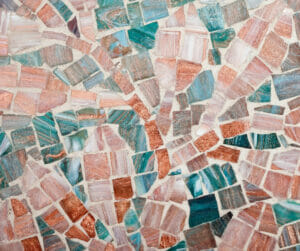
Mosaics are small tiles, typically made from glass or ceramic, arranged in intricate patterns to make a unique and visually striking appearance. They use these often for feature walls or accents in bathrooms and kitchens.
They are just a few of the many types of stone and tiled floors available in the UK, and the choice ultimately depends on your budget, personal preferences, and the specific requirements of your space.
What cleaning solutions do we always recommend to our customers after cleaning their stone/tiled floors:
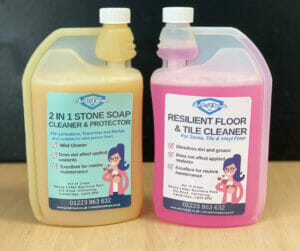
Both solutions we can supply have instructions on the back, so you can’t go wrong with using them. We have two different solutions we recommend:
-
Our Resilient Floor & Tile Cleaner:
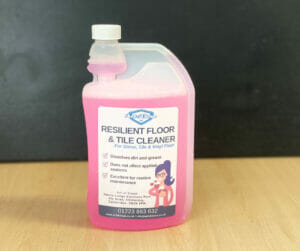
This product is the general one we recommend, and it covers all stone/tile & vinyl floors. They make this with highly effective neutral PH cleaning agents specially formulated to dissolve grease and dirt rapidly.
Because they make it for after you’ve had a professional clean, it won’t affect the applied sealants, making it ideal for routine maintenance. It also leaves your floor sparkling clean.
-
Our 2 in 1 Stone soap cleaner & protector:
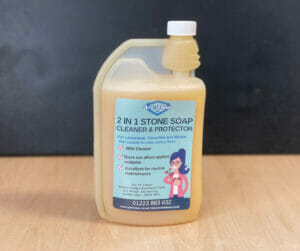
This product is a cleaner we recommend for limestone, travertine, and marble and is suitable for other porous floors.
We recommend testing this one on a small hidden area before use.
Again, this effective neutral PH cleaning solution blend cleans and adds protective properties to your stone floor. However, this product is only for use on natural or porous stone floors. This product won’t affect your sealants if you have had your floor cleaned and sealed professionally. And this is also great for your routine maintenance.
Why your stone floor will become sticky and dirty quicker:
-
When you add solution to water, how do you do it?
When I add cleaning solution, I’ve always just added without measuring. I usually go by the strength of the smell… you too??
This method is where we are going wrong! You see, the more solution you add to the floor, the stickier the floor will become and the dirtier.
If you imagine that the residue is left and every time you do the cleaning, you’re just adding more and more, and the build-up will be sticky and will hold on to the dirt from the traffic going over it!
Always use the correct amount of solution and water! If you over-dilute, it won’t clean any better, but if you over-add the cleaning solution, you create a big build-up.
-
How to correct the problem with stickiness:
The only way to combat this problem is to rinse, rinse, rinse! How do you do the rinsing effectively? Well, the best way is to follow these steps:
- Fill a mop bucket with plain hot water.
- Grab your mop with a fresh new mop head-on… this is important… you want a new mop head to avoid adding more cleaning solutions. (You may have some left in the fibres of the mop.)
- Add your mop to the hot water and then start mopping like you would if you were cleaning. You should repeat this process if you need to, as you could have a lot of products down from the past cleaning.
Check out this video explaining why your tiled floor is getting sticky… and much more! But fear not… There are Chapters for quick answers 👏🏼
To learn more about looking after your stone & tiles floors, you can download our free eBook:
Download our eBook…
To learn more about caring for your stone or tile floors
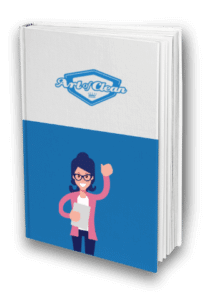
Stone Or Tile Flooring
If you would like to know what type of tile is best for your kitchen floor, click on the link below:
If you would like to learn what a professional will come with and how they will clean your floor, check out this article:
Would you like to read about how we worked for god? Click on the link below:

Edited and written by Tracey Gilbey, Marketing
For further advice or information on our Carpet and Soft Furnishing care, please don’t hesitate to contact the Art of Clean team on 01223 901549 in Cambridge. Our services include Carpet Cleaning, Upholstery Cleaning, oriental and area Rug Cleaning, Curtain Cleaning, Patio and Driveway Pressure washing, Leather Cleaning, Stone and Tile Floor Cleaning and Wood Floor Sanding and Restoration. We also supply new flooring and carpets through our sister company Art of Flooring. Farthings Cambridge provides our Dry Cleaning service.

